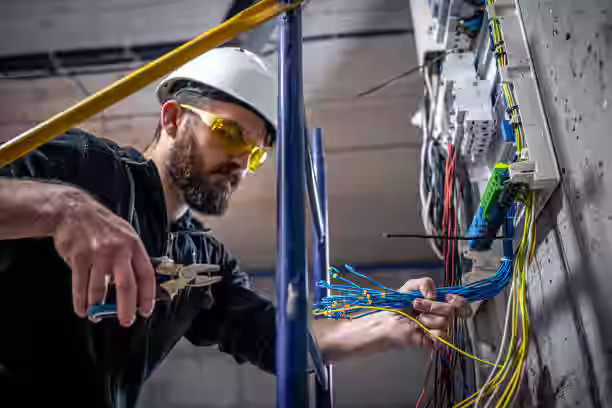You’re looking at that flickering light in your kitchen. It can’t be that hard to fix, right? Just swap out a wire or two.
What those DIY videos never show you is the aftermath when things go wrong.
The burnt outlets. The damaged wires.
The panicked calls to emergency electricians at midnight.
People jump into DIY electrical work thinking they’ll save a bundle.
Then reality hits. Those “simple” fixes turn into expensive nightmares that cost way more than calling a pro from the start.
Let’s talk about why DIY electrical work in Whittier often leaves your wallet lighter than Hiring an electrician Whittier residents trust from day one.
10 Tips Why DIY Electrical Fixes Often Cost More Than Professionals In Whittier
Most homeowners think grabbing a screwdriver and fixing that outlet will save them $150.
But electrical work isn’t like hanging a picture frame.
It’s complicated, dangerous, and heavily regulated.
When DIYers mess up, the costs spiral quickly.
These ten reasons explain why your “money-saving” project might actually drain your bank account faster than paying a professional the first time.
Improper Tools and Equipment
Electrical work needs specialized tools that most homeowners don’t have sitting in their garage.
You might think a basic screwdriver and pliers are enough, but professionals use voltage testers, wire strippers, fish tape, conduit benders, and specialized meters.
Buying these tools for a one-time job makes zero financial sense.
A decent multimeter alone costs $50-100, and that’s just one item on a long list. Professional electricians spread their tool costs across hundreds of jobs.
Even if you buy the tools, you probably won’t get contractor-grade quality.
The cheap stuff breaks or gives inaccurate readings, which leads to mistakes and more expenses.
Inexperience Leads to Mistakes
Electrical work isn’t forgiving of mistakes.
The wiring in your walls doesn’t care that you’re new at this.
Let’s say you connect the wrong wires. Best case? The circuit doesn’t work. Worst case? You create a fire hazard hiding in your walls.
Then you’re paying for an electrician PLUS repair costs for damage.
Professionals make fewer mistakes because they’ve seen it all before.
They know that white wires aren’t always neutral and that mixing wire gauges can create serious hazards.
Their experience prevents costly errors that DIYers make all the time.
The knowledge gap is huge.
Licensed electricians go through 8,000+ hours of training and apprenticeship.
Code Violations and Permits
Electrical codes exist for safety reasons, and they change regularly.
Most homeowners have no idea what NEC Article 210 requires for kitchen receptacles or how many outlets can safely be on one circuit.
Code violations aren’t just dangerous—they’re expensive.
When you sell your house, inspectors find these problems.
If you’re negotiating real estate thousands off your sale price or paying rush rates to fix everything properly.
Permits matter too. DIYers often skip them to save money or avoid hassle.
Big mistake. Unpermitted electrical work can trigger fines, complicate insurance claims, and force you to rip out completed work for inspections.
Professional electricians stay current on code requirements and handle permitting as part of their service.
They make sure everything passes inspection the first time.
Hidden Problems Get Overlooked
Your house might be hiding electrical issues you’d never notice without training.
Aluminum wiring from the 1970s. Overloaded circuits. Improper grounding.
Water damage near electrical components.
When you focus only on fixing that non-working outlet, you miss the bigger problems lurking behind it.
Professionals spot these issues immediately because they know what to look for.
A pro might charge more upfront because they’re fixing problems you didn’t even know existed. But addressing these hidden issues prevents expensive emergencies later.
That overheated wire in the attic could turn into a house fire if ignored.
Damaged Materials and Wastage
DIYers waste materials. They buy the wrong parts.
They damage wires while pulling them through walls.
They miscalculate lengths. All these mistakes add up.
Professionals know exactly what materials they need and how to install them without damage.
They have supplier relationships that often mean better prices than retail stores charge regular customers.
Then there’s the mess factor.
Cutting into walls and ceilings creates dust and debris.
Professionals know how to minimize damage and clean up properly.
DIYers often create bigger holes than necessary, adding drywall repair costs to their electrical project.
Safety Hazards and Medical Bills
Electrical work is dangerous. We’re talking about 120-240 volts flowing through wires that can kill you if mishandled.
The hospital bill from one electrical shock makes any electrician’s invoice look tiny by comparison.
Even minor injuries can mean missed work days and lost income.
Then there’s the fire risk. Electrical fires from improper wiring destroy homes every year.
No amount of savings justifies putting your family’s safety at risk or potentially losing everything you own.
Professional electricians follow strict safety protocols.
They know when to shut off power, how to test circuits properly, and how to secure connections that won’t come loose over time.
Insurance Coverage Issues
Most homeowners don’t realize their insurance policies have clauses about DIY electrical work. If your amateur wiring causes a fire, your claim might be denied.
Some policies explicitly require licensed professionals for electrical modifications.
Others become void if work wasn’t properly permitted.
Either way, you could be stuck paying out of pocket for massive damages.
Professionals carry their own insurance and often warranty their work.
If something goes wrong because of their installation, they’re responsible—not you.
That protection alone justifies their fees.
Time Is Money
DIY electrical projects take longer. Much longer.
What takes a professional two hours might take you two days of frustrated effort.
That’s time you could spend working, relaxing, or doing something you actually enjoy.
Your weekend has value too.
Professionals work efficiently because they’ve done these jobs hundreds of times.
They have processes, proper tools, and don’t need to stop every five minutes to watch another instructional video.
If you’re taking time off work to tackle electrical projects, you’re literally paying to make these repairs with lost income.
Does that math really work out in your favor?
Decreased Home Value
Bad electrical work decreases your home’s value.
Home inspectors flag amateur work instantly, and buyers run away from houses with electrical red flags.
Even if it works, DIY electrical that looks messy or unprofessional sends a signal to buyers: “What else did they cut corners on?” Your home investment is probably your biggest investment.
Why risk its value to save a few hundred dollars?
Professional work, on the other hand, can increase your home’s value.
Updated electrical systems are selling points, especially in older Whittier neighborhoods where outdated wiring is common.
Cost of Calling Professionals Anyway
Here’s the kicker—many DIY electrical projects end with a desperate call to a professional.
After hours of frustration, wasted materials, and maybe a minor shock or two, you give up and call the pro you should have hired from the start.
Now you’re paying for:
- All the materials you already bought and possibly damaged
- The professional’s regular fee
- Possibly emergency rates if you need immediate help
- Extra charges to fix your mistakes before addressing the original problem
Starting with a professional costs less than paying them to fix your failed DIY attempt.
Just ask any electrician how much of their business comes from cleaning up homeowner mistakes.
They’ll tell you it’s a significant percentage.
Conclusion
DIY has its place. Paint your walls. Build a bookshelf. Plant a garden.
But when it comes to electricity, the numbers simply don’t add up for most homeowners.
The tools, materials, permits, knowledge gap, safety risks, and potential for costly mistakes make professional electrical work the better financial choice almost every time.
Think about what you’re really saving.
A few hundred dollars upfront might cost you thousands later, not to mention the stress and safety risks along the way.
Next time you face an electrical problem in your Whittier home, do the math beyond the hourly rate.
Consider all these hidden costs of DIY before deciding against a professional.
Sometimes the cheapest option is paying someone who knows exactly what they’re doing the first time around.
Your home, wallet, and peace of mind will thank you.



